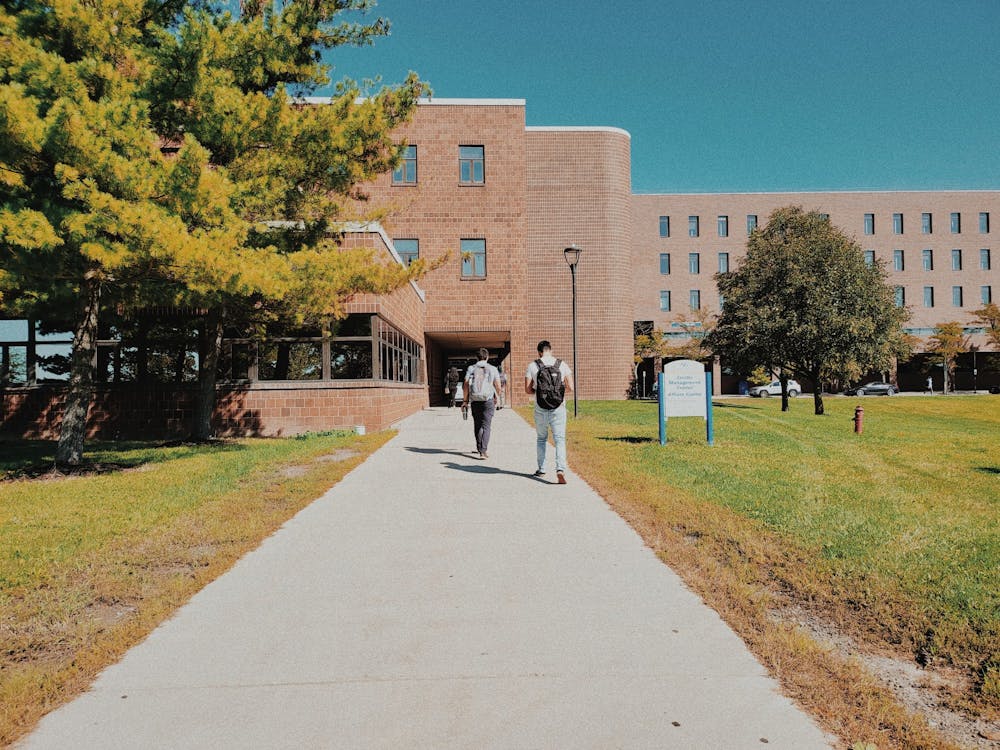On paper, Cam Hotto seems like an unlikely candidate to co-found an environmental club.
Hotto, a senior in the School of Management, studies finance and entrepreneurship — two curriculums that don’t typically pair well with the term “sustainability.” But that’s exactly what drove Hotto to establish the UB Sustainable Business Association with his friend Max Schynoll.
“The School of Management doesn’t offer [many] sustainability-focused courses,” Hotto said. “[I thought] it would be cool to start an organization focused on sustainable business… I felt like there was a gap there, [so] I filled it.”
Business programs across the country have begun offering major-specific concentrations, certificates, and even master’s degrees in sustainable business in response to the growing need for environmentalism in the sector.
UB’s School of Management offers four courses with a focus on sustainability, per UB’s course catalog — MGO 439: Sustainable Operations Management, MGG 637: Business Management Implications for Sustainable Development, MGO 639: Sustainable Operations, and MGO 645: Sustainability as a Business Strategy.
UB SBA started a little over a year ago. In the past year, the club has run several events about sustainable business practices, co-hosted events with other clubs and had several professionals in the field speak to students.
Hotto, who currently serves as president of UB SBA, says his hometown and childhood influenced his environmentalism. Hotto grew up in a small-rural-town-turned-suburbia and spent summers in a cottage on Lake Ontario. He recognizes the privilege of living somewhere desirable but says the ecological impacts from the business have been devastating.
“It [local business development] wasn’t happening in a sustainable way,” Hotto said. “Tearing down forests to put up houses or strip malls. When I was seven a Walmart came to town and destroyed a valley in town… [Fishing in Lake Ontario as a kid] I’d hear stories about how the fishing used to be so great. But there were no fish because of the Round Goby [invasive species], and there would be plastic trash on the beach.”
Hotto says UB SBA is unique because he believes the club encompasses every student’s academic interests.
“I’ve always thought about how sustainability can be implemented into all areas of business,” Hotto said. “We all have a concentration, whether it be marketing, HR, finance, international business [or] supply chain management. You really don’t need to have a sustainability job to make an impact. In an ideal world, sustainability jobs should just be regular jobs. You shouldn’t have to have sustainability in your title, that should be part of your job already.”
UB SBA has hosted events in partnership with other business organizations within the School of Management like UB DECA — a club for entrepreneurs — and has brought in local sustainable business leaders to talk about what they do and why their work is valuable. Club leaders are also planning to get involved with ‘miscellaneous events’ during UB’s Sustainability Month.
The club was founded during the pandemic when few students were on-campus. Even as students have returned to campus, the club has struggled with attendance. Sophia Mesler, a freshman business major and the club’s vice president of marketing, says she aims to see the club grow.
“[I’d like] more people to come to the events and spread the word about SBA because a lot of people know about sustainability but they’re not interested in learning more,” Mesler said. “Sustainable doesn’t just mean that you have to be a crazy environmentalist; you can make small changes and make an impact.”
UB SBA’s vice president Rob Siegel, a junior business major, echoed that sentiment.
“We have an advantage on other clubs like the marketing or accounting clubs. You’re not going to join those clubs unless you’re in those concentrations,” Siegel said. “[We’re] not competing with any clubs, [students] can do both.”
UB SBA is at one major disadvantage — it doesn’t have a budget. The club is recognized by the School of Management, but unlike clubs run through organizations like the Student Association, clubs don’t automatically get funds. Some organizations, like UB DECA, require their members to pay dues, but Hotto isn’t interested in such a system.
“I’m anti-dues because I don’t want to pay to join a club,” Hotto said. “Also, what’s it going to buy? I’ll buy everyone pizza if that’s what we do — food wasn’t even allowed last semester!”
Julie Frey is a senior news/features editor and can be reached at julie.frey@ubspectrum.com

Julie Frey is a senior news/features editor at The Spectrum. She is a political science and environmental studies double major. She enjoys theorizing about Taylor Swift, the color yellow and reading books that make her cry. She can be found on Twitter @juliannefrey.





